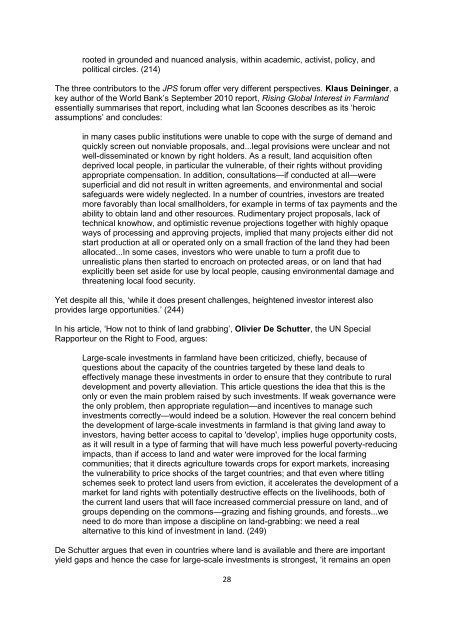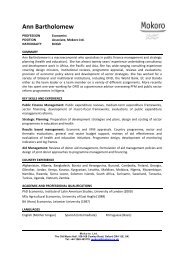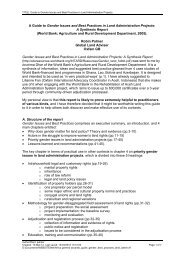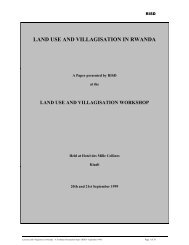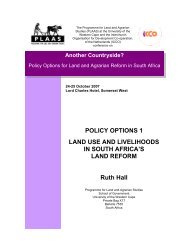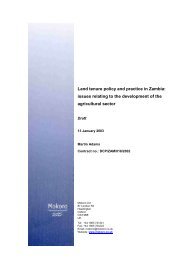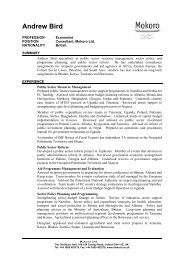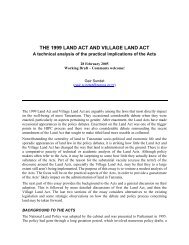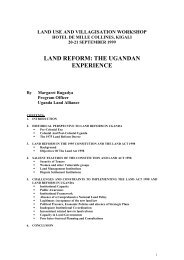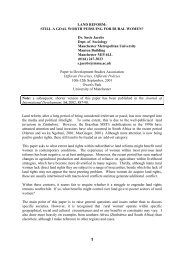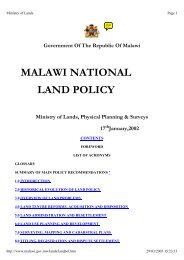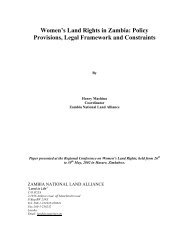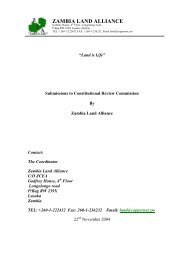Biofuels and Land Grabbing in Africa - Mokoro
Biofuels and Land Grabbing in Africa - Mokoro
Biofuels and Land Grabbing in Africa - Mokoro
Create successful ePaper yourself
Turn your PDF publications into a flip-book with our unique Google optimized e-Paper software.
ooted <strong>in</strong> grounded <strong>and</strong> nuanced analysis, with<strong>in</strong> academic, activist, policy, <strong>and</strong><br />
political circles. (214)<br />
The three contributors to the JPS forum offer very different perspectives. Klaus De<strong>in</strong><strong>in</strong>ger, a<br />
key author of the World Bank’s September 2010 report, Ris<strong>in</strong>g Global Interest <strong>in</strong> Farml<strong>and</strong><br />
essentially summarises that report, <strong>in</strong>clud<strong>in</strong>g what Ian Scoones describes as its ‘heroic<br />
assumptions’ <strong>and</strong> concludes:<br />
<strong>in</strong> many cases public <strong>in</strong>stitutions were unable to cope with the surge of dem<strong>and</strong> <strong>and</strong><br />
quickly screen out nonviable proposals, <strong>and</strong>...legal provisions were unclear <strong>and</strong> not<br />
well-dissem<strong>in</strong>ated or known by right holders. As a result, l<strong>and</strong> acquisition often<br />
deprived local people, <strong>in</strong> particular the vulnerable, of their rights without provid<strong>in</strong>g<br />
appropriate compensation. In addition, consultations—if conducted at all—were<br />
superficial <strong>and</strong> did not result <strong>in</strong> written agreements, <strong>and</strong> environmental <strong>and</strong> social<br />
safeguards were widely neglected. In a number of countries, <strong>in</strong>vestors are treated<br />
more favorably than local smallholders, for example <strong>in</strong> terms of tax payments <strong>and</strong> the<br />
ability to obta<strong>in</strong> l<strong>and</strong> <strong>and</strong> other resources. Rudimentary project proposals, lack of<br />
technical knowhow, <strong>and</strong> optimistic revenue projections together with highly opaque<br />
ways of process<strong>in</strong>g <strong>and</strong> approv<strong>in</strong>g projects, implied that many projects either did not<br />
start production at all or operated only on a small fraction of the l<strong>and</strong> they had been<br />
allocated...In some cases, <strong>in</strong>vestors who were unable to turn a profit due to<br />
unrealistic plans then started to encroach on protected areas, or on l<strong>and</strong> that had<br />
explicitly been set aside for use by local people, caus<strong>in</strong>g environmental damage <strong>and</strong><br />
threaten<strong>in</strong>g local food security.<br />
Yet despite all this, ‘while it does present challenges, heightened <strong>in</strong>vestor <strong>in</strong>terest also<br />
provides large opportunities.’ (244)<br />
In his article, ‘How not to th<strong>in</strong>k of l<strong>and</strong> grabb<strong>in</strong>g’, Olivier De Schutter, the UN Special<br />
Rapporteur on the Right to Food, argues:<br />
Large-scale <strong>in</strong>vestments <strong>in</strong> farml<strong>and</strong> have been criticized, chiefly, because of<br />
questions about the capacity of the countries targeted by these l<strong>and</strong> deals to<br />
effectively manage these <strong>in</strong>vestments <strong>in</strong> order to ensure that they contribute to rural<br />
development <strong>and</strong> poverty alleviation. This article questions the idea that this is the<br />
only or even the ma<strong>in</strong> problem raised by such <strong>in</strong>vestments. If weak governance were<br />
the only problem, then appropriate regulation—<strong>and</strong> <strong>in</strong>centives to manage such<br />
<strong>in</strong>vestments correctly—would <strong>in</strong>deed be a solution. However the real concern beh<strong>in</strong>d<br />
the development of large-scale <strong>in</strong>vestments <strong>in</strong> farml<strong>and</strong> is that giv<strong>in</strong>g l<strong>and</strong> away to<br />
<strong>in</strong>vestors, hav<strong>in</strong>g better access to capital to 'develop', implies huge opportunity costs,<br />
as it will result <strong>in</strong> a type of farm<strong>in</strong>g that will have much less powerful poverty-reduc<strong>in</strong>g<br />
impacts, than if access to l<strong>and</strong> <strong>and</strong> water were improved for the local farm<strong>in</strong>g<br />
communities; that it directs agriculture towards crops for export markets, <strong>in</strong>creas<strong>in</strong>g<br />
the vulnerability to price shocks of the target countries; <strong>and</strong> that even where titl<strong>in</strong>g<br />
schemes seek to protect l<strong>and</strong> users from eviction, it accelerates the development of a<br />
market for l<strong>and</strong> rights with potentially destructive effects on the livelihoods, both of<br />
the current l<strong>and</strong> users that will face <strong>in</strong>creased commercial pressure on l<strong>and</strong>, <strong>and</strong> of<br />
groups depend<strong>in</strong>g on the commons—graz<strong>in</strong>g <strong>and</strong> fish<strong>in</strong>g grounds, <strong>and</strong> forests...we<br />
need to do more than impose a discipl<strong>in</strong>e on l<strong>and</strong>-grabb<strong>in</strong>g: we need a real<br />
alternative to this k<strong>in</strong>d of <strong>in</strong>vestment <strong>in</strong> l<strong>and</strong>. (249)<br />
De Schutter argues that even <strong>in</strong> countries where l<strong>and</strong> is available <strong>and</strong> there are important<br />
yield gaps <strong>and</strong> hence the case for large-scale <strong>in</strong>vestments is strongest, ‘it rema<strong>in</strong>s an open<br />
28


